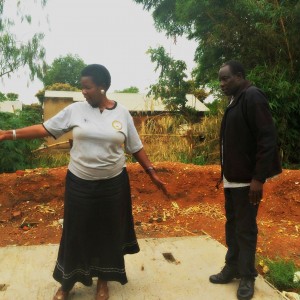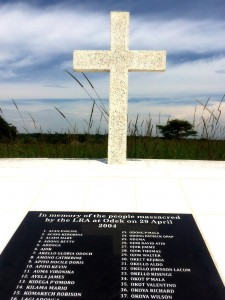This past week has presented itself with some challenges for me. I’ve been adjusting to this new environment while still dealing with life that is waiting for me in the US in addition to the work here having a bit of a monkey wrench thrown into the mix. More on that in a bit, but I want to first thank and recognize the head honcho of the GDPU, Patrick Ojok.
Patrick has been managing the GDPU for many years and has been an AP partner for over 5. Prior to joining the GDPU he was a teacher. Last week he drove me all over Gulu on his motorbike as we went to assess schools for their level of accessibility. It was heartwarming to see that at just about every school, Patrick saw a teacher who was once his student.
We visited 6 different schools in the Gulu Municipality last week to determine where the best setting would be for our project. The good news is that almost all of the schools that we visited had made made improvements in their facilities and had latrines that were new and accessible. Some other good news is that every school we visited was interested in inclusion training, which is definitely needed. Despite having great intentions, the teachers and administration need some education about what having a disability means and what a person with a disability is capable of accomplishing.
While our field visits showed great progress it also presented some issues for our plan for the project this year. We are able to provide inclusion training to multiple schools it’s unclear if any of these particular schools would benefit from a new latrine. I suppose that adjusting plans is something that comes with the territory of this type of work and what can seem like a perfect idea in planning stages often doesn’t work because of various unforeseen circumstances. Although it’s frustrating, it’s also an opportunity to rethink a plan of action to make the right kind of impact.
Another thing that comes with the territory with this type of international work is getting to know and understand a new culture. While Patrick and I were thinking of how to move forward with our project, I was able to go on another type of field visit with him and other GDPU staff to Odek, where some of the team has been conducting research. Odek is about an hour and a half from Gulu and is where the LRA leader Joseph Kony is originally from. When I learned that we were in a place where such a violent and evil person grew up I got a queasy feeling in my stomach. When I met some of the people who live in the town, I couldn’t help but reflect again on the resilience of people but also notice the way that grief is handled so differently here.
Loss is something that seems so familiar within the community and, from what I’ve observed, feelings don’t stop people from doing what they need to do every day. Some of my GDPU coworkers have lost friends and family members recently and have said little more about it than “it happens.” The social worker in me could have a field day with writing on this topic and while I’ll refrain from opining on if this is a “right” or “wrong” way of managing grief and loss, I will say it’s been complicated for me to understand how to manage my (many) emotions while I’m here.
I think the challenge and gift of this fellowship is to cope with change in it’s various forms in an unfamiliar place. Some of these struggles feel difficult to manage right now but I’m hopeful that both the GDPU and I will come out stronger at the end of this.
Posted By Amy Gillespie (Uganda)
Posted Jun 27th, 2016




11 Comments
Rachael Hughen
June 28, 2016
Sounds like changing plans and goals is definitely part of the work here, and that’s perfectly fine! We will all help you rethink your gameplan on this end if needed, and it sounds like there is a lot of need for inclusion training across the region- whether they have toilets or not yet. Good luck in Odek, I can’t even imagine how emotionally tasking that is. Can’t wait to see how you adapt and thrive to these challenges!
Laura Stateler
June 29, 2016
Thank you for your raw emotions! You are doing great work and it seems like you are also taking time to reflect. I would love in the future to read about more of your thoughts on grief, especially pertaining to children!
Morgan Moses
June 30, 2016
Amy, I totally feel where you are coming from with this post. The adjustment to a new culture is one thing, especially while trying to keep up with the things happening in the US, but having to adjust your plan for work is another layer. For me, at least, I knew before I left that I was heading into a world of adjustments, but it didn’t hit me that I would actually have to emotionally deal with making those adjustments until I was in the middle of it. Keep at it! You are doing such wonderful things and I’m so excited to see the path this work takes.
Paul
July 6, 2016
Clearly inclusion is an important part of the disability movement, what are you doing to increase inclusion for people with disabilities ?
Rita
July 7, 2016
Patrick seems to be very committed in education and improving the condition for disabled children in Gulu! Despite the challenges you’re facing, I think you’ve already started to transform and cope with the environment because you “shut up and listen” and learn from the people you encounter. Just a side note, don’t forget to listen to yourself as well. Keep up the great work, Amy!
Amy Gillespie (Uganda)
July 11, 2016
Paul: You are absolutely right, inclusion is a HUGE part of the disability movement and something the GDPU works really hard on. Inclusion training is something that will go along with putting in the accessible toilet in schools. The GDPU has facilitators to train teachers on aspects on inclusion including use of appropriate language, awareness of issues and very importantly, how to teach students these same principles. The GDPU is hoping to provide training in more schools over the next few years. If all goes as planned we will be conducting some trainings in a few schools in the next few weeks so I will definitely be posting about that soon.